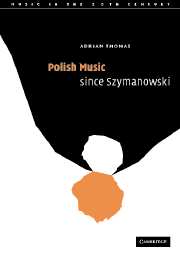Book contents
- Frontmatter
- Contents
- List of musical examples
- Preface
- Acknowledgements
- List of abbreviations
- Part I The captive muse
- 1 Szymanowski and his legacy
- 2 The Second World War
- 3 Post-war reconstruction
- 4 Socialist realism I: its onset and genres
- 5 Socialist realism II: concert music
- Part II Facing west
- Part III The search for individual identity
- Part IV Modernisms and national iconographies
- Part V Postscript
- Appendix 1 Cultural events in Poland, 1953–6
- Appendix 2 ‘Warsaw Autumn’ repertoire, 10–21 October 1956
- Appendix 3 ‘Warsaw Autumn’ repertoire, 1958–61
- Appendix 4 Selected Polish chronology (1966–90)
- Notes
- Select bibliography
- Index
5 - Socialist realism II: concert music
Published online by Cambridge University Press: 22 September 2009
- Frontmatter
- Contents
- List of musical examples
- Preface
- Acknowledgements
- List of abbreviations
- Part I The captive muse
- 1 Szymanowski and his legacy
- 2 The Second World War
- 3 Post-war reconstruction
- 4 Socialist realism I: its onset and genres
- 5 Socialist realism II: concert music
- Part II Facing west
- Part III The search for individual identity
- Part IV Modernisms and national iconographies
- Part V Postscript
- Appendix 1 Cultural events in Poland, 1953–6
- Appendix 2 ‘Warsaw Autumn’ repertoire, 10–21 October 1956
- Appendix 3 ‘Warsaw Autumn’ repertoire, 1958–61
- Appendix 4 Selected Polish chronology (1966–90)
- Notes
- Select bibliography
- Index
Summary
In the early 1950s, no one in Poland had any reason to think that the Stalinist policy of socialist realism would ever be changed: the pattern of Soviet-inspired governmental interference in the creative arts seemed there to stay. ‘Przesłuchanie’ were a prime controlling mechanism throughout 1950–2 and, despite financial blandishments in the form of commissions, especially for the socialist-realist showcase Festival of Polish Music in 1951 (and its follow-up four years later), nothing could hide the fact that musical life was closely steered and monitored by the Party and its cultural agencies. That was the main reason why Palester, who had spent more time in Paris than in Poland since 1947, eventually decided to remain in France and was struck off the list of members of the ZKP in April 1951. A month later, Czesław Miłosz – who went on to become one of Poland's foremost writers and winner of the Nobel Prize for literature in 1980 – quit his diplomatic post as Polish cultural attaché in Paris and went into exile. In both cases, their work was banned for the foreseeable future in Poland, and they deliberately did themselves no favours by attacking the PZPR and its policies both on air and in print. Palester broadcast for many years from 1952 on the Polish-language section of Radio Free Europe and went into print in the Polish expatriate press in Paris.
- Type
- Chapter
- Information
- Polish Music since Szymanowski , pp. 59 - 80Publisher: Cambridge University PressPrint publication year: 2005



